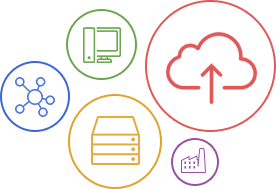
What isn't information technology (IT) tied up with, nowadays? Well, medical and IT practices aren’t as distant as one would think. Health information technology (health IT) improves the delivery of healthcare services by reducing the instances of medical errors and improves the outcome of medical procedures. A study also claims that IT services in the healthcare industry make facilitating care and patient data tracking easier and more efficient.
But what exactly does IT have to do with healthcare?
Simple, the purpose of health IT is to provide better care for patients using the latest innovations in technology as well as the more accurate analysis of patient data. This helps medical professionals improve the delivery of healthcare and allow both the public and the private sector to implement policies and regulations to better treat known diseases. Healthcare IT solutions include medical software management, electronic health records (EHR) and electronic medical records (EMR) support, and remote patient monitoring among other things.
These services assist healthcare entities by leveraging the latest technology in streamlining important processes and operations. However, the cost of these innovations remains a huge hindrance for healthcare providers. Emil Isanov, CEO of managed IT services provider ETech 7, discusses how managed IT can help bridge the gap between healthcare and information technology.

In essence, managed IT is a type of outsourced service that provides reliable, affordable, and timely solutions to a business’ IT needs. The same goes for IT services in healthcare. “It is not simply putting two and two together - the upward trajectory of technology and the millions and millions of electronic protected health information (ePHI) could be difficult to maintain and keep track of,” begins Isanov. “However, it is not entirely impossible to ensure the safety of patient data. With the right mix of information and application, IT could play a more vital part in ensuring the safety of data in the healthcare industry.”
Healthcare IT support services, simplified
A managed IT service provider should be able to provide entities in the medical and healthcare field with standard IT services like IT consulting, helpdesk support, server monitoring and maintenance, data security, and managed server backup and disaster recovery.
“It isn’t enough for healthcare and medical service providers to digitize their data and store it on the cloud. Same thing as network and information security is not just about placing firewalls and antivirus software. These days, keeping your data safe involves varying degrees of security measures and enough tech-savvy to detect a harmful email when you see one. But remember, all it takes is one,” says Isanov.

The rapid expansion of IT’s role in any type of industry has made it possible for cyberattacks to come from any direction. However, with managed IT services, healthcare companies will be able to scale the level of support that it needs while ensuring the safety of its data.
The role of healthcare IT consulting in HIPAA compliance
Speaking of data, one of the most important factors that have shaped the healthcare industry to what it is now is the Health Insurance Portability and Accountability Act (HIPAA). HIPAA is a regulation that ensures the protection of sensitive patient information or any other information encompassed in the electronic protected health information (ePHI). In order to comply with HIPAA, medical companies, healthcare providers, and other private practices must have physical and online security measures to safeguard sensitive patient information. Thankfully, IT services in the healthcare industry offer just that.

“A competent managed IT services provider should know that it is their responsibility to protect your clients’ ePHI for your company or your independent practice to stay HIPAA compliant. Most doctors and healthcare providers are unaware that in order to be HIPAA compliant - your IT department or your IT service provider should regularly backup all patient data,” says Isanov. “The great thing about IT consulting is how customizable it can be. Knowing what your company needs and clearly communicating it with your managed IT service provider would reduce the risk of a breach in your system or unexpected downtime.”
In this day and age, most companies are tired of reactive or break/fix IT approaches, with managed IT services - a company is guaranteed to have a dedicated team of IT professionals that oversee and monitor its IT needs. What better way to ensure your IT security than to leave it to experienced experts that have built a business around providing IT services?
“Healthcare and medical service providers quite possibly handle more sensitive information than an average company since it deals with patient information. “If you’re already considering working with IT service providers, it is important to know what types of safety and security measures they can offer,” says Isanov. “IT service providers often offer various types of security measures that intertwine with one another to provide a sort of layering. With the threat of cyberattacks hitting from anywhere, each security layer should have individual capabilities in case another layer has flaws that can be exploited by hackers.”

It looks as though healthcare, much like any other industry, is still trying to grasp the overwhelming potential of information technology in improving its processes. Even if the potential benefits are still being determined on a case-to-case basis, the outlook looks clear: healthcare IT solutions improve the delivery of medical services and utilize patient data effectively for more personalized treatment.
ETech 7 is a managed IT services company dedicated to providing superior quality service to a wide range of businesses. Leveraging state of the art software and world-class service, ETech 7 strives to deliver affordable and reliable solutions for your IT needs. For more information, visit www.etech7.com.












